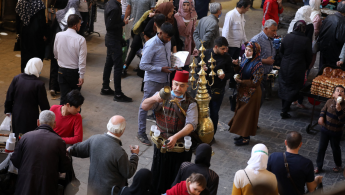Syria juice vendor gears up for Ramadan as crisis bites
The popular street vendor says he usually has more customers during the Islamic holy month starting next week, during which many favour the drink to break their day-long fast at sundown.
But he says his trade of more than 40 years has also taken on new meaning since the war-torn country has been plunged into economic crisis.
"My main job is to make customers smile," says the moustachioed father of 16, dressed in billowing trousers, a patterned waistcoat and red fez.
"What's most important is that they leave me feeling happy - that whoever turns up stressed leaves feeling content," adds the street vendor.
On his daily rounds of the Hamidiyah covered market, dozens of customers approach him to quench their thirst, often taking pictures of him and his traditional get-up with their cellphones.
As he nimbly pours juice in long streams into plastic cups, he distracts them for a while with a song.
A surgical face mask lowered under his chin, Kremed intones lyrics for a mother and her two young daughters, before handing her a cup of the dark brown beverage.
He takes his fez off to collect his payment, then places it back on the top of his head.
Twitter Post
|
Another man, dressed in a long white robe, joins Kremed in a song then gives him a peck on the cheek as he leaves.
'Financial worries'
Syria's economic crisis has sent prices soaring and caused the national currency to plummet in value against the dollar on the black market.
In a country where a large majority of people live in poverty, Syrians have also had to contend with several lockdowns to stem the spread of coronavirus.
"For three years, Ramadan has been different because of people's financial worries," Kremed says.
"When people come to the market, you see them bumping into each other as if they were in a daze."
After a decade of conflict which began with the brutal suppression of peaceful protests by the regime, the country is suffering multiple economic crises while an estimated 80 percent of Syrians live in poverty.
The Damascus government blames the economic crisis on Western sanctions, but economists say the conflict, the pandemic and the financial crisis in neighbouring Lebanon are also major factors.
Some state institutions have temporarily been closed over the pandemic and the economic crisis, but for now, markets remain open.
Although he does his best to keep up a cheery demeanour, Kremed says he too is feeling the effects of the economic crunch.
Read also: Protesters commemorate anniversary of Syrian regime Douma chemical massacre
Tamarind and sugar are becoming increasingly costly, he says, and not everyone has enough spare cash for a refreshment.
"People's priorities have become putting food and drink on the table, before tamarind juice," he says.
Agencies contributed to this report.
Follow us on Facebook, Twitter and Instagram to stay connected



